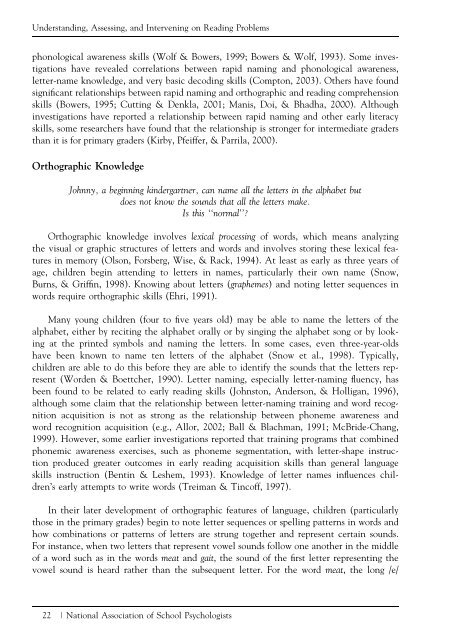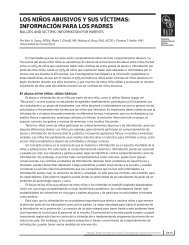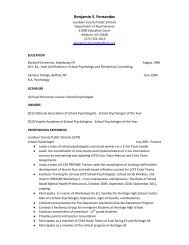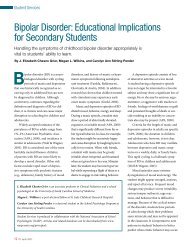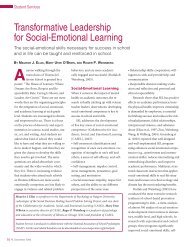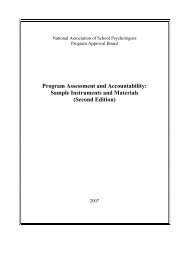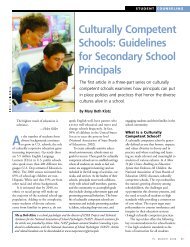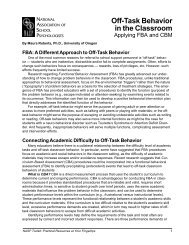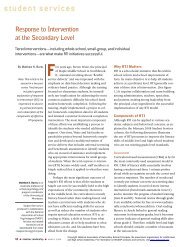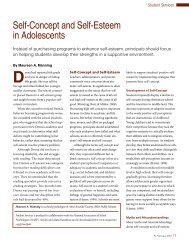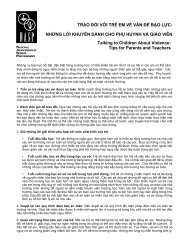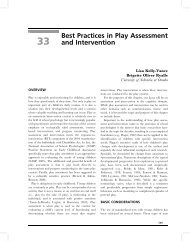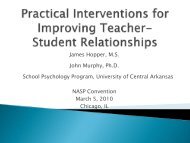Chapter 1 - National Association of School Psychologists
Chapter 1 - National Association of School Psychologists
Chapter 1 - National Association of School Psychologists
Create successful ePaper yourself
Turn your PDF publications into a flip-book with our unique Google optimized e-Paper software.
Understanding, Assessing, and Intervening on Reading Problems<br />
phonological awareness skills (Wolf & Bowers, 1999; Bowers & Wolf, 1993). Some investigations<br />
have revealed correlations between rapid naming and phonological awareness,<br />
letter-name knowledge, and very basic decoding skills (Compton, 2003). Others have found<br />
significant relationships between rapid naming and orthographic and reading comprehension<br />
skills (Bowers, 1995; Cutting & Denkla, 2001; Manis, Doi, & Bhadha, 2000). Although<br />
investigations have reported a relationship between rapid naming and other early literacy<br />
skills, some researchers have found that the relationship is stronger for intermediate graders<br />
than it is for primary graders (Kirby, Pfeiffer, & Parrila, 2000).<br />
Orthographic Knowledge<br />
Johnny, a beginning kindergartner, can name all the letters in the alphabet but<br />
does not know the sounds that all the letters make.<br />
Is this ‘‘normal’’?<br />
Orthographic knowledge involves lexical processing <strong>of</strong> words, which means analyzing<br />
the visual or graphic structures <strong>of</strong> letters and words and involves storing these lexical features<br />
in memory (Olson, Forsberg, Wise, & Rack, 1994). At least as early as three years <strong>of</strong><br />
age, children begin attending to letters in names, particularly their own name (Snow,<br />
Burns, & Griffin, 1998). Knowing about letters (graphemes) and noting letter sequences in<br />
words require orthographic skills (Ehri, 1991).<br />
Many young children (four to five years old) may be able to name the letters <strong>of</strong> the<br />
alphabet, either by reciting the alphabet orally or by singing the alphabet song or by looking<br />
at the printed symbols and naming the letters. In some cases, even three-year-olds<br />
have been known to name ten letters <strong>of</strong> the alphabet (Snow et al., 1998). Typically,<br />
children are able to do this before they are able to identify the sounds that the letters represent<br />
(Worden & Boettcher, 1990). Letter naming, especially letter-naming fluency, has<br />
been found to be related to early reading skills (Johnston, Anderson, & Holligan, 1996),<br />
although some claim that the relationship between letter-naming training and word recognition<br />
acquisition is not as strong as the relationship between phoneme awareness and<br />
word recognition acquisition (e.g., Allor, 2002; Ball & Blachman, 1991; McBride-Chang,<br />
1999). However, some earlier investigations reported that training programs that combined<br />
phonemic awareness exercises, such as phoneme segmentation, with letter-shape instruction<br />
produced greater outcomes in early reading acquisition skills than general language<br />
skills instruction (Bentin & Leshem, 1993). Knowledge <strong>of</strong> letter names influences children’s<br />
early attempts to write words (Treiman & Tinc<strong>of</strong>f, 1997).<br />
In their later development <strong>of</strong> orthographic features <strong>of</strong> language, children (particularly<br />
those in the primary grades) begin to note letter sequences or spelling patterns in words and<br />
how combinations or patterns <strong>of</strong> letters are strung together and represent certain sounds.<br />
For instance, when two letters that represent vowel sounds follow one another in the middle<br />
<strong>of</strong> a word such as in the words meat and gait, the sound <strong>of</strong> the first letter representing the<br />
vowel sound is heard rather than the subsequent letter. For the word meat, the long /e/<br />
22 <strong>National</strong> <strong>Association</strong> <strong>of</strong> <strong>School</strong> <strong>Psychologists</strong>


